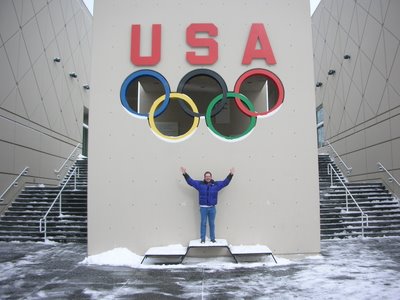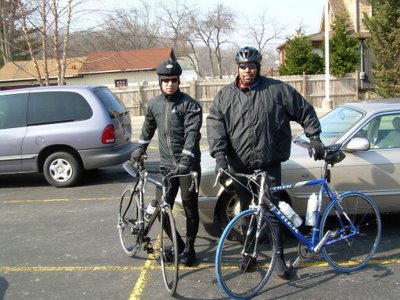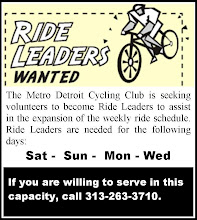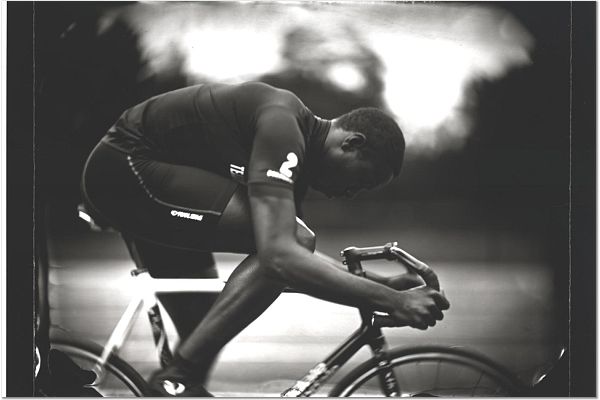We hit the Motown Museum, Comerica Park, and The Joe Louis Fist. Reggie got a flat and headed down Jefferson toward home and the three of us continued on to Belle Isle. After a lap around the island and a stop for warmth, we hit the road toward home.
Saturday, December 22, 2007
We hit the Motown Museum, Comerica Park, and The Joe Louis Fist. Reggie got a flat and headed down Jefferson toward home and the three of us continued on to Belle Isle. After a lap around the island and a stop for warmth, we hit the road toward home.
Thursday, December 20, 2007
A priceless piece of sporting history
September 3, 2004

Carrying a legend ... Major Taylor rides the black bike - now owned by Jack Walsh - in Sydney in 1903.
American cyclist Major Taylor, an early victim of racism in sport, once raced at the SCG, writes Steve Meacham.
Jack Walsh, the veteran Australian cycling champion, is pointing out some unusual features on his most prized possession. "Notice the cotterless cranks, the forked crown, the six-day outrigger ..."
Only a fellow cycling enthusiast could possibly understand what he is talking about. But then you don't need to know much about cycling technology to appreciate why the plain old black bike he's pointing at is so precious. You just need to know the story of the man who once rode it.
Few people in Australia now recognize the name Major Taylor. But in America, it is revered.
A decade before Jack Johnson shocked white supremacists by becoming the world's first black heavyweight boxing champion, Major Taylor overcame the same hostilities. When he arrived in Australia in 1902, Taylor was considered one of the most controversial characters in international sport, as only the second black athlete in history (after bantamweight boxer George Dixon) to earn the title world champion.
That's what makes Walsh's "plain old black bike" so remarkable. Though it has been on display virtually unnoticed in Walsh's suburban cycling shop for 15 years, it would excite interest from collectors around the world if he ever put it up for auction. No other cycle ridden by Taylor has ever been identified.
Marshall W. Taylor was born in 1878 in Indiana. His nickname, "Major", came from a soldier's uniform he wore as a 14-year-old when he was hired to perform cycling stunts outside an Indianapolis bike shop. "He was only a little bloke," says Walsh, now 83. "About five foot six [168 centimeters]. A bantamweight, but very powerful."
In 1896 Taylor unofficially broke his first two world records in Indianapolis. Instead of being lauded as a hero, he was banned from the track - too many whites had been offended.
Thereafter he was often refused entry to professional races because of his colour. The southern states wouldn't let him compete at all. Hotels refused to let him stay.
Despite this, by 1898 Taylor held no fewer than seven world records. Even bigots found it difficult to argue in 1899 when he defeated all the white riders to become world one mile (1.6 kilometers) champion in Montreal.
Taylor would have won more events but for his Baptist principles. Like Eric Liddell, the Scottish runner whose story was told in the film Chariots of Fire, Taylor would not race on Sundays.
From 1902 to 1904 he competed annually in Australia, helping to draw crowds of up to 35,000 at the Sydney Cricket Ground (which in those days had a cycling track around it).
In his history of the SCG, Phil Derriman records that in 1903 Taylor, "a deeply religious young man with a reputation for fair play on the track and clean living off it", preached at the Wesley Church in Regent Street, "urging the young men in the congregation to forgo all sports and amusements on Sunday".
His most notorious race came in 1904 when the Australian promoter Hugh D. McIntosh staged his second annual Sydney Thousand at the SCG, offering a staggering £759 to the winner. All the leading American sprinters took part.
Taylor, the favourite who had started up to 165 meters behind some riders under a handicap, finished fourth after appearing to be deliberately boxed in by rivals on the last lap.
After the race an investigation proved that two white American rivals, Floyd MacFarland and Ivor Lawson, had ganged up to prevent Taylor winning in a betting scandal. Of the 11 original starters, seven were banned for up to three years. Taylor was given the runner-up's prize of £110.
The bike Taylor rode at the SCG is the one now on display in Walsh's Punchbowl shop. Walsh discovered the American had given it to a friend in Melbourne when he sailed from Australia in 1904, and it had remained in the family ever since.
Walsh won't disclose how much he paid - "it was a fair bit" - but received confirmation of its cult status recently.
A US film company, making a movie of Taylor's life, twice sent experts from America to inspect the bike. After various tests, they agreed it was definitely Taylor's and offered him $30,000 for it. Walsh refused.
"I'll never sell it. I admire Major Taylor too much. Not just his ability and the way he rode, but the way he lived his life."
Taylor died a pauper in 1932 in Chicago. He was buried in an unmarked grave.
Wednesday, June 13, 2007
Wednesday, May 23, 2007
Saturday, May 19, 2007
Wednesday, May 09, 2007
Monday, April 30, 2007
Sunday, February 04, 2007

to graduate from USA Cycling Mechanics Clinic
Colorado Springs, Colo. (January 25, 2007) – USA Cycling graduated 46 participants from the Bill Woodul Mechanics Clinic earlier this month as mechanics from around the country took advantage of a unique, one-of-a-kind opportunity to learn from industry instructors, receive hands-on experience and network with leaders in the cycling industry.
Students came from all corners of the United States, with a few traveling from Canada. At the completion of the only instructional seminar of its kind in the world, 46 mechanics completed the course and earned the privilege to carry a USA Cycling mechanic’s license.
As a USA Cycling-licensed mechanic, individuals become eligible for certain industry jobs with cycling-related companies or professional teams and enhance their employment opportunities at local bike shops.
Industry experts from various parts of the racing community made presentations on numerous topics:
The lessons were taught by experts from companies such as MAVIC, Park Tool and Shimano to name a few – all companies that put an emphasis on a license issued by the national governing body.
“It’s really a neat program and the only one that exists in the world,” commented Andy Stone, neutral support technician for Shimano and guest instructor at the clinic. “If someone with a USA Cycling license comes out to work for my tech program, or Mavic’s tech program, I know they’re going to have basic knowledge of the job so that they can be useful in the field and improve their skills. Being licensed by USA Cycling is very important to Shimano because we know we’re getting a person that’s trained, and if you want to work for Shimano in any of our tech programs or service department, it’s almost a job requirement.”
By featuring some of the top instructors in the industry, the Bill Woodul Mechanics Clinic hosted by USA Cycling provides instruction by those considered experts in their field.
“The instructors are the best part,” commented USA Cycling director of logistics and operations Ken Whelpdale. “They do a phenomenal job for no pay and average about 15 hours per day of instruction and interaction with the students. It’s an extremely valuable part of what we do in terms of out mechanics program. Our clinic actually trains the mechanics before they go out on the job so that they’ll have the hands-on experience before they get there.”
The clinic is named after Bill Woodul, who held the first USA Cycling mechanics clinic in the late 1980’s as a way to recruit mechanics for his program.
Past graduates of the program have gone on to work for teams all over the world.
USA Cycling would like to recognize Eddie Sloan and the other 45 graduates of the 2007 Bill Woodul Mechanics Clinic:



















